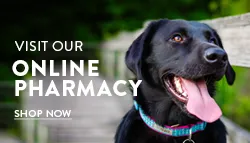The 5 Most Common Questions Regarding Pets & Dental Health
1. How often does my pet need a dental cleaning?
In a simple answer—only as often as needed. For some dogs this is as often as yearly, for others it is only needed once or twice in a lifetime. Most pets fall somewhere in between. Regular dental examination (yearly) is the best way to determine what an individual pet needs.
2. My pet is eating fine so how can there be dental problems or pain?
This is a frequent finding despite obvious pain and discomfort on dental evaluation. Possible explanations include:
- • The problem has been slow to develop and the pet has not complained.
- • The pet is stoic and not complaining
- • For the pet to stop eating enough for people to notice it requires total pain and loss of function. Prior to that degree of severity there can be significant pain, distress, and disease that festers without the pet showing outward signs. In other words, change of appetite is the last sign the pet will show, and only after the problem is unbearable.
In order to clean the teeth to resolve any periodontal disease, discomfort, or infection locally or affecting the entire body, four things need to be performed.
- • Clean all of the teeth and periodontal pockets with an ultrasonic cleaner and polisher. Ultrasonic cleaners generate a large amount of bacterial laden aerosol that will harm the patient if inhaled. General anesthesia protects the airway and the patient from this problem.
- • The teeth need to be probed for pockets and disease. Dogs and cats do not tolerate such evaluation while awake.
- • Dental X-rays are sometimes needed to assess the presence and degree of disease associated with teeth. This cannot be performed unless a patient is under anesthesia
- • Extractions are sometimes needed. Sometimes this is expected, sometimes it is not. Extractions are not possible without anesthesia.
Anesthesia is a serious consideration and should never be taken lightly. In order to clean the teeth to resolve or prevent health problems and discomfort, ultrasonic scaling is necessary. Ultrasonic scaling cannot be done safely without general anesthesia. Additionally, many unexpected lesions are found once the teeth are cleaned resulting in the need for dental radiographs, probing, and sometimes extractions. Anesthesia is again needed for these procedures. So, safe dental cleaning cannot be done without anesthesia.
Anesthesia, for any purpose, does have risk. However, if blood work is normal and anesthesia is performed in a cautious and safe manner (IV catheter, fluids, antibiotics, complete and continuous monitoring) then the risk is very small. The risk is similar to that associated with a spay or neuter if performed as described above in an otherwise healthy patient.
5. What can I do to prevent the need for a dental cleaning?
There are many things that can be done to slow the accumulation of tartar. Depending on your pets breed and individual predisposition some of these techniques may have varying success. Some proven methods to reduce tartar accumulation and keep the mouth and body healthy:
- • Brushing, brushing, brushing. Be sure to use a toothpaste for dogs or cats
- • Diets: some special diets do reduce tartar accumulation. We especially recommend these in pets that have recurrent problems or who have needed recurrent cleanings.
- • Treats: These can be the most effective. Some treats are particularly great at getting tartar off–this is usually related to how much the pet chews on the treat. We recommend raw hide chews (CET brand) as well as Greenies. For a complete list of proven products visit the Veterinary Oral Health Council (www.vohc.org) website.
- Please remember that even with the most cooperative pet and diligent attention by the owner cannot prevent completely the progression of dental disease. Eventually, cleaning under anesthesia may be needed. This is similar to the fact that, despite brushing and flossing daily, many people visit the dentist every six months with problems noted on exam.


